第20章
Now the object of semen is to be of such a nature that from it as their origin come into being those things which are naturally formed, not because there is any agent which makes them from it as simply because this is the semen.Now we speak of one thing coming from another in many senses; it is one thing when we say that night comes from day or a man becomes man from boy, meaning that A follows B; it is another if we say that a statue is made from bronze and a bed from wood, and so on in all the other cases where we say that the thing made is made from a material, meaning that the whole is formed from something preexisting which is only put into shape.In a third sense a man becomes unmusical from being musical, sick from being well, and generally in this sense contraries arise from contraries.
Fourthly, as in the 'climax' of Epicharmus; thus from slander comes railing and from this fighting, and all these are from something in the sense that it is the efficient cause.In this last class sometimes the efficient cause is in the things themselves, as in the last mentioned (for the slander is a part of the whole trouble), and sometimes external, as the art is external to the work of art or the torch to the burning house.Now the offspring comes from the semen, and it is plainly in one of the two following senses that it does so- either the semen is the material from which it is made, or it is the first efficient cause.For assuredly it is not in the sense of Abeing after B, as the voyage comes from, i.e.after, the Panathenaea; nor yet as contraries come from contraries, for then one of the two contraries ceases to be, and a third substance must exist as an immediate underlying basis from which the new thing comes into being.We must discover then, in which of the two other classes the semen is to be put, whether it is to be regarded as matter, and therefore acted upon by something else, or as a form, and therefore acting upon something else, or as both at once.For perhaps at the same time we shall see clearly also how all the products of semen come into being from contraries, since coming into being from contraries is also a natural process, for some animals do so, i.e.from male and female, others from only one parent, as is the case with plants and all those animals in which male and female are not separately differentiated.Now that which comes from the generating parent is called the seminal fluid, being that which first has in it a principle of generation, in the case of all animals whose nature it is to unite; semen is that which has in it the principles from both united parents, as the first mixture which arises from the union of male and female, be it a foetus or an ovum, for these already have in them that which comes from both.(Semen, or seed, and grain differ only in the one being earlier and the other later, grain in that it comes from something else, i.e.the seed, and seed in that something else, the grain, comes from it, for both are really the same thing.)We must again take up the question what the primary nature of what is called semen is.Needs must everything which we find in the body either be (1) one of the natural parts, whether homogeneous or heterogeneous, or (2) an unnatural part such as a growth, or (3) a secretion or excretion, or (4) waste-product, or (5) nutriment.(By secretion or excretion I mean the residue of the nutriment, by waste-product that which is given off from the tissues by an unnatural decomposition.)Now that semen cannot be a part of the body is plain, for it is homogeneous, and from the homogeneous nothing is composed, e.g.from only sinew or only flesh; nor is it separated as are all the other parts.But neither is it contrary to Nature nor a defect, for it exists in all alike, and the development of the young animal comes from it.Nutriment, again, is obviously introduced from without.
It remains, then, that it must be either a waste-product or a secretion or excretion.Now the ancients seem to think that it is a waste-product, for when they say that it comes from all the body by reason of the heat of the movement of the body in copulation, they imply that it is a kind of waste-product.But these are contrary to Nature, and from such arises nothing according to Nature.So then it must be a secretion or excretion.
But, to go further into it, every secretion or excretion is either of useless or useful nutriment; by 'useless' I mean that from which nothing further is contributed to natural growth, but which is particularly mischievous to the body if too much of it is consumed; by 'useful' I mean the opposite.Now it is evident that it cannot be of the former character, for such is most abundant in persons of the worst condition of body through age or sickness; semen, on the contrary, is least abundant in them for either they have none at all or it is not fertile, because a useless and morbid secretion is mingled with it.